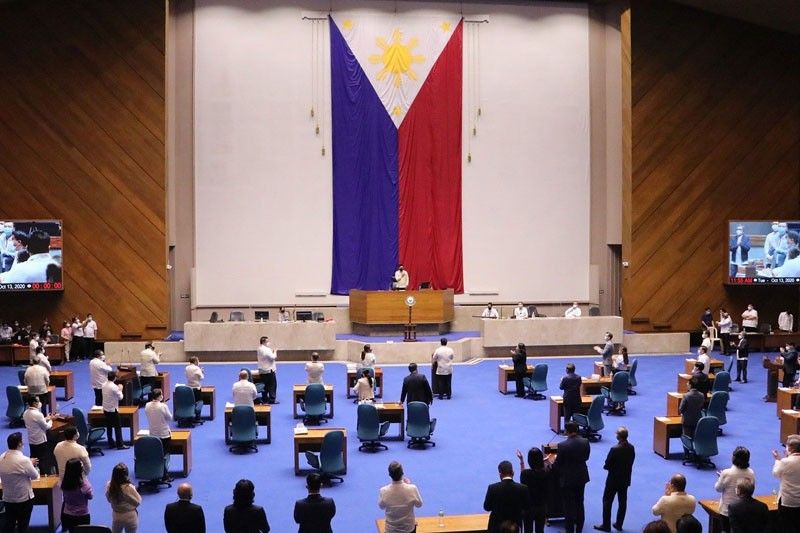Presumption of guilt? Proponents defend drug bill

MANILA, Philippines — Proponents defended the measure recently passed by the House of Representatives that aims to give more teeth to the country’s anti-drug law, but which critics decry as unconstitutional.
Dangerous drugs committee chair Ace Barbers said the proposed amendments to Republic Act 9165 (Comprehensive Dangerous Drugs Act) under House Bill No. 7814 are legal and will not open the floodgates to abuses by law enforcers.
Barbers, who principally authored the bill, rebutted arguments raised by critics that the measure – approved on final reading by the House last Tuesday – violates the Constitution, which protects the presumption of innocence of the accused in criminal cases until proven guilty.
“These presumptions provided in the bill are legal, disputable. You can dispute that in the process before the courts. These are supported by jurisdiction as the Supreme Court had ruled in several cases that legal presumptions are allowed,” he explained in Wednesday night’s episode of “The Chiefs” on Cignal TV’s One News.
The Surigao del Norte congressman further argued that even the Revised Penal Code allows legal presumptions in criminal cases, citing for instance the presumption of malice in criminal libel cases.
“These legal presumptions are not tantamount to being presumed guilty, simply because there is still the process of trial and only the court can determine guilt of an accused,” he said.
Barbers also explained that the burden of proof will not shift to the accused – as alleged by critics – and will remain with the prosecution.
He gave assurance that the measure would not allow further abuses by authorities, which critics of the administration’s drug war have been raising.
“Presumption of innocence is still protected. It is not a presumption of guilt,” the congressman said. “What’s important here is there should be an arrest first before such legal presumption can take place.”
Barbers said the bill is actually in response to administration critics who are persistent in seeing “big fish” being caught in the drug war.
“For example, a general interceded in behalf of an arrested drug suspect. Under the current law, you can’t run after the general and only the suspect will be convicted. This measure will actually address what critics have been complaining about,” he said.
Objections
Other congressmen, however, opposed the measure.
Muntinlupa Rep. Ruffy Biazon and members of the Makabayan bloc objected to what they believe is a violation of presumption of innocence of drug suspects.
Biazon authored a version of the measure, but withdrew his authorship from the consolidated version approved on final reading by 188 congressmen.
“I personally find discomfort with the consolidated version of the bill that’s why I voted against it. The presumption of innocence until proven guilty is something I believe in,” he told The Chiefs in the same episode.
The six Makabayan bloc members, who were among the 11 who voted against HB 7814, alleged that the measure “signals the start of a new phase of the so-called war against drugs, characterized by bloodier operations threatening the lives and safety of innocents and more extrajudicial killings, alongside sweeping discretion yet zero accountability of law enforcement agents.”
“With at least 30 presumptions against mere suspects and favoring PNP (Philippine National Police), PDEA (Philippine Drug Enforcement Agency) and other law enforcement agents, House Bill 7814 whittles down the constitutional presumption of innocence to a mere sliver,” they said in a statement.
PNP welcomes measure
Yesterday, PNP spokesman Brig. Gen. Ildebrandi Usana said the law enforcement community welcomes the passage of the measure which makes the country’s anti-drug law more effective.
“The PNP welcomes any conceivable legislative bill geared towards putting an end to illegal drugs in the country,” he said in a statement.
As the implementer of the President’s anti-drug war, the PNP sees any measure what would help them achieve a drug-free country a welcome development, he said.
While the measure introduces legal presumptions against persons who could be considered coddlers or protectors and financiers of drug suspects or syndicates, Usana said lawmakers are sure to have put safeguards against human rights abuses.
“We are confident though that the legislators have the Constitution, human rights, and the protection of society in mind when they craft a legislative reform,” he said.
CHR: Unconstitutional!
But the Commission on Human Rights (CHR) is against these “legal presumptions.”
“The presumption of guilt in the bill goes against this right guaranteed for the accused under the Bill of Rights of our 1987 Philippine Constitution,” the CHR said.
“We wish to highlight that our system of laws adheres to the rule of law and its basic tenets provide that a person is presumed innocent until proven guilty,” said CHR commissioner Karen Gomez-Dumpit.
CHR spokesperson Jacqueline de Guia underscored the basic principle of presumption of innocence until proven guilty as a fundamental protection for the accused against wrongful conviction.
“Justifying the departure from safeguard and to assert that it serves the community’s interest exposes innocent individuals to wrongful accusations and abuse of authority,” she said.
“While CHR supports the efforts of the government to eradicate the illegal drug menace in the country, we have been staunch in emphasizing that it must be at all times in accordance with the rule of law and human rights standards,” De Guia added.
Death penalty
Dumpit also reiterated the commission’s position against the reintroduction of death penalty, which is also included in the proposed House measure.
“We reiterate that the death penalty is not an effective deterrent and if passed, this is considered a serious breach of our international obligations, particularly under the International Covenant on Civil and Political Rights and its Second Optional Protocol aiming at the abolition of the death penalty,” she said.
She urged lawmakers to instead pursue bills that would address recovery from the pandemic, citing thousands of lives that have been lost and many others in peril.
“The reintroduction of the death penalty will create more problems particularly in terms of livelihood that may be lost given the dire economic situation especially of the disadvantaged, marginalized and vulnerable sectors of society,” said Dumpit. — Emmanuel Tupas, Janvic Mateo
- Latest
- Trending






























